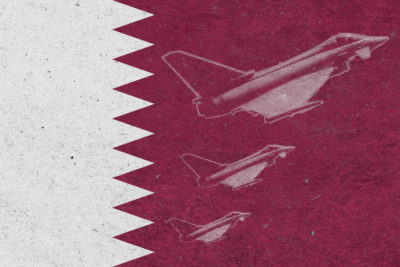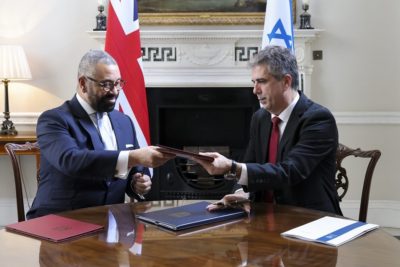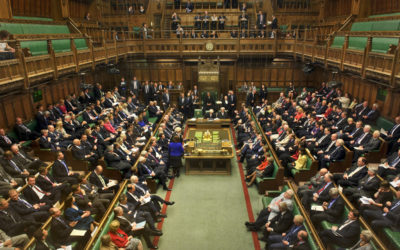The Qatari Connection

The announcement that the Royal Air Force (RAF) and Royal Navy will take part in counter-terrorism operations during the 2022 FIFA Men’s World Cup in Qatar caused relatively little stir when announced at the end of May. Perhaps many in the UK are numb to Britain’s relationships with violent Gulf monarchies and the merging of international sports events with militarist values. Whilst our relationships in the Gulf may vary, there is one constant between them: British military support and huge deals for UK defence companies.
Unsurprisingly, the relationships are riddled with inconsistencies. Britain claims to hold itself as a guardian of human rights and a notional international order based around the rule of law – but on Qatar, as with other Gulf allies, this claim falls apart. Even more so when we take into account the UK’s pursuit of an exclusive deal for Qatari natural gas and how this has, in the past few months, been framed as the answer to reliance on Russian gas in the wake of the Ukraine invasion. Given these conditions, the military relationship between Qatar and the UK has a number of unique and interesting features that warrant closer examination. We decided to take a deeper look at how the two countries have been, and increasingly are, intertwined on matters of war, security and trade.
Big Problems – Big Spenders
The Campaign Against the Arms Trade (CAAT) describes Qatar as:
‘…an authoritarian state with strict judicial contraints on freedom of expression. Detainees are subject to beatings and cruel treatment while a great many immigrant workers are trapped in conditions of forced labour.’
But CAAT also notes that its status among the region’s authoritarian states, all of whom enjoy high degrees of UK support, is distinct. Between June 2017 and January 2021, Qatar was boycotted by Egypt, Saudi Arabia, Bahrain and the UAE for ‘destabilising the region with its support for Islamist groups’ and allegedly being too close to Iran. Arguably an odd charge, given some of the accuser’s own enduring dalliances with radical Islamism, and one that Qatar strenuously denies. Nobody really knows why the four year diplomatic crisis ended, and there are apparently still unresolved tensions between the parties.
Regardless, in 2018 Qatar signed a £5 billion deal with Britain to help finance an order of BAE-manufactured Eurofighter Typhoon and Hawk jets. According to UK Export Finance (UKEF), an export credit agency run by the British state, the move was the single largest transaction in its history. Industry press sources claim it followed a growing trend at UKEF for financing defence exports to countries in the Middle East and Asia Pacific. Qatar has undoubtedly benefited from this pivot by UKEF, with CAAT also citing figures from the Stockholm International Peace Research Institute showing the Emirate was one of the largest importers of arms globally between 2015-2019: thanks to a whopping 631% increase in purchases compared to the previous four years. This does not tell the full story however. When looking at military expenditure in relation to population size – also known as per capita spending – Qatar easily comes out on top (and way out in front of Israel in second place).
Military Friendships and Interdependence
Alongside the ever increasing arms exports, military relations between the British and Qatari governments have deepened in recent years. And if we take a longer view, the entire history of Qatar is one of dependence on western military sponsorship. Following the fall of the Ottoman Empire, Britain signed a treaty with Qatar in 1913 which effectively made the emerging state’s national security a British responsibility. Over the 1920s and 1930’s, when oil was first discovered off the Qatari coast by a British Army officer, this relationship was expanded, setting the tone for subsequent relations between the two states. However, in 1968, when the Labour Government announced that Britain would withdraw from territories east of the Suez Canal, the treaties of protection with the Qatari and other Gulf monarchies were annulled – setting off a chain of events that led to the formation of the state of Qatar in 1970.
Still, the British government maintained its ties and the militarist nature of the continuing relationship runs deep. The two Emir’s who have ruled Qatar since 1995 – Sheikh Hamad bin Khalifa Al Thani and his son Tamim bin Hamad Al Thani – are both graduates of the Royal Military Academy at Sandhurst, as was Hamad bin Khalifa Al Thani’s third son Jasim and former Prime Minister Abdullah bin Khalifa Al Thani. There are undoubtedly a number of mutual benefits to this training, but former British defence attache to Saudi Arabia, Peter Sincock, perhaps sums up a crucial one:
‘For British people drifting around the world, as I did as a soldier, you find people who were at Sandhurst and you have an immediate rapport. I think that’s very helpful, for example, in the field of military sales.‘
Military sales and a whole lot more in fact. In the years since the UKEF export deal, exchanges between the UK and Qatar have not stopped. There was the 2020 offer of a British base for the Qatari air force’s nine Hawk trainings jets (the same nine jets, presumably, which formed part of the 2018 package); a 2021 approach from the UK asking the Emirate to be Britain’s gas supplier of last resort; and a £10bn business agreement signed in May 2022 covering cyber, financial technology and zero emissions vehicles. The latter was inked during a visit by Sheikh Tamim bin Hamad Al Thani that ended with the MoD announcing its support at the FIFA World Cup.
But perhaps the most significant deal of all was the formation of 12 Squadron, a joint RAF-Qatari unit based in the UK. Interestingly, the partnership will be a temporary endeavour to train Qatari pilots and ground crew as part of the aforementioned deal to supply Eurofighter Typhoons. The RAF has not formed a joint-squadron with another country since the Second World War. Now it has two with Qatar – a second joint-squadron, based at RAF Leeming, and designed to provide pilots with additional flight hours and training, was announced in April 2021. That said, the partnership will go beyond training when 12 Squadron oversees the aeriel element of security work during the World Cup.
The UK also maintains an RAF HQ in Qatar at Al Udeid which, according to Commons Library documents, is home to No. 83 Expeditionary Warfare Group. This base serviced the war against ISIS in Syria and northern Iraq and remains the operational HQ for both the RAF and the US Air Force in the Middle East.
So, it seems Qatar is always near the top of the list when it comes to relationships with the British military establishment: its significance cemented, and perhaps confirmed, by the 2007 launch of RUSI Qatar, the first overseas branch established by The Royal United Services Institute, a prominent military think-tank, since its founding in 1831. The presence of such a highly regarded part of Britain’s wider defence ecosystem – and one that underpins its intellectual legitimacy – certainly suggests an important role for the Gulf monarchy.
British Realpolitik
While Qatar is notionally independent, its history is built around British colonialism and militarism. Its legal system is profoundly backwards, its treatment of workers and attitudes to human rights are lamentable. You only have to look at the conditions – and myriad deaths – faced by workers helping to build the stadiums and transport infrastructure for the FIFA World Cup. This is not to exonerate Qatar’s western sponsors. The fact the UK continues not only to arm and trade with Qatar – and do so increasingly – but to train and equip Qatar’s repressive military and police, is a powerful commentary on British realpolitik.
It also speaks volumes about the role of the armed forces – or, more accturately the MoD and military top brass – in ensuring trade deals and foreign investment. Whilst we’ve covered some of those trade deals above, there is so much more we could not include: like the sizeable London property portfolio held by companies associated with the Qatari royal family. To come back to the World Cup, the specifics of any British contribution to security are, like many aspects of the UK’s relationship with Gulf states, vaguely explained. What does seem clear is that these relationships amount to tacit approval of Qatar’s repressive behaviour so long as the money keeps flowing. Much the same can be said for the World Cup as a whole.
See more: human rights, arms trade, defence & foreign policy
Like what you read?
> Sign up for our newsletter or blog notifications
> Support our work – from just £2 a month









